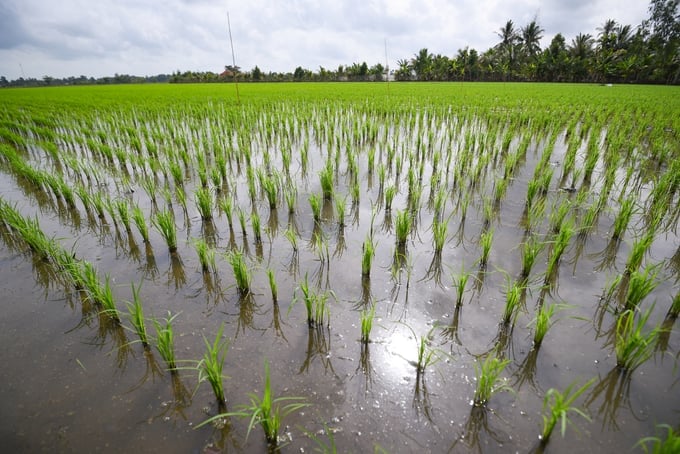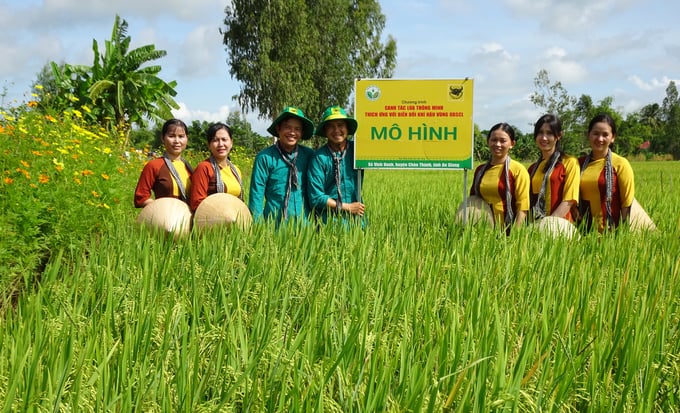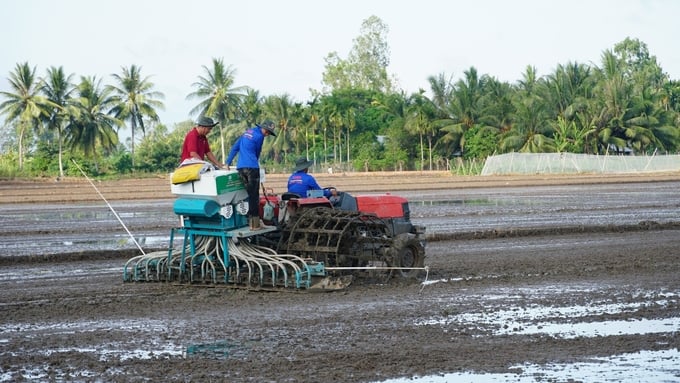May 21, 2025 | 19:49 GMT +7
May 21, 2025 | 19:49 GMT +7
Hotline: 0913.378.918
May 21, 2025 | 19:49 GMT +7
Hotline: 0913.378.918

The 1 million ha high-quality, low-emission rice project in the Mekong Delta has achieved many positive results. Photo: Tung Dinh.
Recently, Deputy Prime Minister Tran Luu Quang chaired a meeting to hear reports on progress and resolve difficulties, and obstacles in the implementation of the "Sustainable Development Project for 1 Million Ha of Specialized High-Quality, Low-Emission Rice Linked with Green Growth in the Mekong Delta Region by 2030" (the Project).
The Deputy Prime Minister acknowledged and highly appreciated the proactive role of the Ministry of Agriculture and Rural Development (MARD) in coordinating with ministries, agencies, and 12 provinces in the Mekong Delta to actively implement many specific activities and pilot models. These efforts have initially brought positive results, as reflected in indicators such as reduced water, seed, and fertilizer usage, lower total input costs, and increased productivity and profits compared to control models.
However, as the first country to implement large-scale emission reductions in rice production, Vietnam has limited experience from which to draw. Additionally, rice cultivation areas are still fragmented and small-scale, and the production infrastructure is not yet synchronized.
Furthermore, the number of households and businesses participating in linkages with cooperatives and cooperative groups to invest in production and product consumption remains limited.
Currently, there is no dedicated domestic budget to implement the Project, and the process of developing and approving World Bank (WB) loan projects requires a significant amount of time.
Based on MARD's report on rice production and export in recent years and forecasts for the near future, it can be seen that Vietnam's rice industry has never had a more favourable opportunity for development.

The pilot models for the 1 million ha high-quality rice project have initially yielded positive results. Photo: VAN.
This project has initiated a new production method that aligns with production and consumption trends, while also creating a breakthrough in agricultural thinking in the context of the Mekong Delta region facing the negative impacts of climate change. It contributes to improving the income and livelihood of rice farmers and businesses, realizing the goal of achieving net zero emissions by 2050.
Therefore, at this meeting, ministries and sectors unanimously resolved to successfully implement the project. They also recognized that, alongside the initial results, there are still many tasks to be carried out, requiring significant determination and active participation from ministries, sectors, and agencies. Especially important is the proactive role of the Ministry of Agriculture and Rural Development (MARD), the decisive involvement of the Mekong Delta provinces, as well as appropriate funding from the central and local budgets, contributions from businesses, support from international organizations and partners, and other legitimate resources.
To ensure the project is implemented on schedule and effectively, Deputy Prime Minister Tran Luu Quang proposed that MARD study and absorb the opinions of relevant ministries and agencies and continue to vigorously implement the key tasks and solutions identified in the Government leadership's directives.

Deputy Prime Minister Tran Luu Quang assigned MARD to coordinate with the MNRE to direct and guide localities in rice land planning. Photo: VAN.
Additionally, they are to review and complete the project implementation plan, clearly defining the tasks and responsibilities of central and local government departments, expected outcomes, and deadlines for each task. They should create a detailed roadmap for each specific task at each stage, serving as a basis for monitoring, inspecting, urging, and timely handling of issues.
Deputy Prime Minister Tran Luu Quang also requested that MARD effectively implement existing mechanisms and policies, while simultaneously focusing on researching and advising the Government and the Prime Minister on amending, supplementing, and promulgating new breakthrough mechanisms and policies related to this issue.
Another task is to lead and closely coordinate with MNRE to direct and guide localities in rice land planning, zoning, and specifically identifying areas for high-yield, high-quality rice cultivation, and strictly protected specialized rice-growing areas. They should also issue technical-economic norms based on the "Technical Process for High-Quality, Low-Emission Rice Production in the Mekong Delta."
Besides MARD, Deputy Prime Minister Tran Luu Quang also directed relevant ministries, sectors, and localities to closely coordinate in handling the tasks of the Project.
Deputy Prime Minister Tran Luu Quang assigned MARD to coordinate with related units to carry out tasks related to carbon credits, the carbon market, capital needs, the use of ODA funds, funds from international partners, and to promote propaganda to change awareness and create consensus at all levels.
Translated by Hoang Duy

(VAN) At the conference to disseminate Resolution No. 68, AgriS introduced its digital agricultural ecosystem and reaffirmed its commitment to accompanying the Government in promoting private sector development and sustainable agriculture.

(VAN) 'Blue Ocean - Blue Foods' initiative is designed to restore marine ecosystems and establish sustainable livelihoods for local communities by cultivating a minimum of 1,000 hectares of cottonii seaweed in the first three years.
/2025/05/21/4642-3-112707_603.jpg)
(VAN) The V-SCOPE project has made direct contributions to three out of six pillars of the Comprehensive Strategic Partnership between Vietnam and Australia.

(VAN) Facing the threat of rabies spreading to the community, Gia Lai province urgently carries out measures to vaccinate dogs and cats on a large scale.

(VAN) Disease-free livestock farming not only protects livestock herds but also stabilizes production and livelihoods for many farmers in Tuyen Quang.

(VAN) Japan's grant aid project contributes to capacity building, promoting organic agricultural production, and fostering sustainable community development in Dong Thap province.

(VAN) For years, the CRISPR-Cas9 genome technology has been reshaping genetic engineering, a precision tool to transform everything from agriculture to medicine.